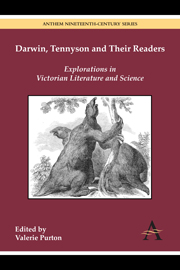Book contents
- Frontmatter
- Contents
- Introduction
- Chapter 1 Tennyson's ‘Locksley Hall’: Progress and Destitution
- Chapter 2 ‘Tennyson's Drift’: Evolution in The Princess
- Chapter 3 History, Materiality and Type in Tennyson's In Memoriam
- Chapter 4 Darwin, Tennyson and the Writing of ‘The Holy Grail’
- Chapter 5 ‘An Undue Simplification’: Tennyson's Evolutionary Afterlife
- Chapter 6 ‘Like a Megatherium Smoking a Cigar’: Darwin's Beagle Fossils in Nineteenth-Century Popular Culture
- Chapter 7 ‘No Such Thing as a Flower […] No Such Thing as a Man’: John Ruskin's Response to Darwin
- Chapter 8 Darwin and the Art of Paradox
- Chapter 9 Systems and Extravagance: Darwin, Meredith, Tennyson
- Chapter 10 T. H. Huxley, Science and Cultural Agency
- Notes on Contributors
Chapter 5 - ‘An Undue Simplification’: Tennyson's Evolutionary Afterlife
- Frontmatter
- Contents
- Introduction
- Chapter 1 Tennyson's ‘Locksley Hall’: Progress and Destitution
- Chapter 2 ‘Tennyson's Drift’: Evolution in The Princess
- Chapter 3 History, Materiality and Type in Tennyson's In Memoriam
- Chapter 4 Darwin, Tennyson and the Writing of ‘The Holy Grail’
- Chapter 5 ‘An Undue Simplification’: Tennyson's Evolutionary Afterlife
- Chapter 6 ‘Like a Megatherium Smoking a Cigar’: Darwin's Beagle Fossils in Nineteenth-Century Popular Culture
- Chapter 7 ‘No Such Thing as a Flower […] No Such Thing as a Man’: John Ruskin's Response to Darwin
- Chapter 8 Darwin and the Art of Paradox
- Chapter 9 Systems and Extravagance: Darwin, Meredith, Tennyson
- Chapter 10 T. H. Huxley, Science and Cultural Agency
- Notes on Contributors
Summary
On 30 October 1894, some two years after his father's death, Hallam Tennyson wrote to Thomas Henry Huxley asking him to contribute perhaps a line or two to the official biography he was preparing. Not long before his final illness, Hallam had taken his aged father to the Natural History Museum in London, where they had seen Boehm's statue of Charles Darwin, which Huxley had officially inaugurated there. He now suggested that Huxley might provide a critical estimate of the late Poet Laureate's outlook on religion, on science and on the soul — a rather broad assortment of topics which, Hallam must have hoped, Huxley was uniquely placed to weave together and fashion into a coherent picture of Tennyson's attitude to the matters of life and death. After all, these were subjects upon which both men had published and which they had also discussed together at the Metaphysical Society in the 1870s.
Thomas Huxley himself had collapsed once already, during the previous winter. His health had picked up in the spring, and he had polished off a somewhat similar piece for The Life of Richard Owen, undertaken at the request of Sir Richard's grandson. In addition, Huxley had finished the ‘Prolegomena’ to ‘Evolution and Ethics’, with which he prefaced the text of his 1893 Romanes lecture in the ninth volume of his Collected Essays. Taken together, this essay and its accompanying ‘Prolegomena’ contained Huxley's own definitive answer to the questions implicit in Hallam Tennyson's request.
- Type
- Chapter
- Information
- Darwin, Tennyson and their ReadersExplorations in Victorian Literature and Science, pp. 65 - 80Publisher: Anthem PressPrint publication year: 2013



